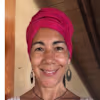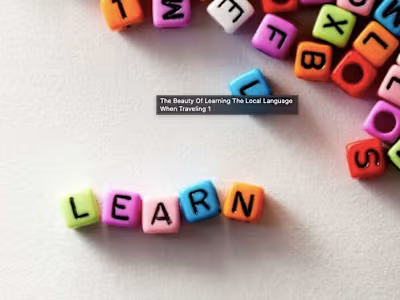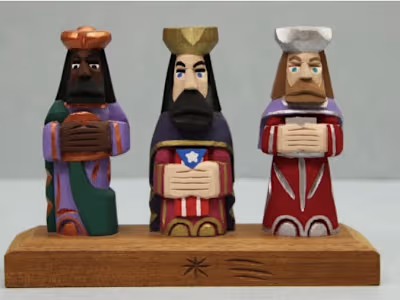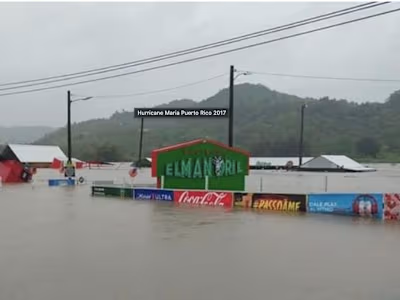Yuma Inarú Pouerie: A Fierce Drummer in the Male-Dominated La B…
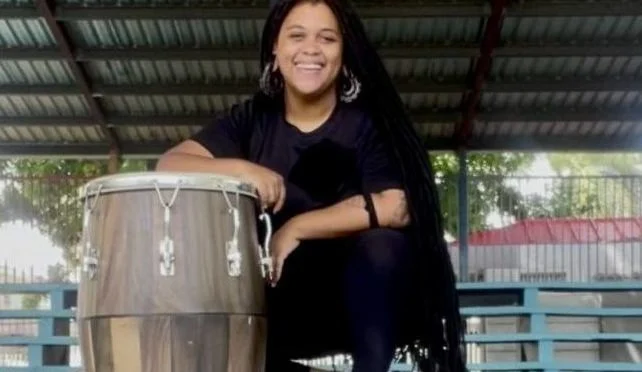
Photo: Yuma Inarú Pouerie photo gallery
Dating back over 400 years to a time when enslaved persons were kidnapped from Africa and brought to Borikén (as the Indigenous called Puerto Rico), the vibrant folk tradition of Puerto Rican Bomba has always held a strong feminine presence. Whether leading the chorus through its storytelling’s prominent call-and-response feature or ardently dialoguing with el tambor (the drum), female faces are not rare here. But when we think of the three elements behind this fiery genre (song, dance, and percussion), women too often are only seen representing the first two. Fortunately, things are changing, we’re seeing stereotypes being questioned and dismantled and among those making a change is Educator and Cultural Advocate Yuma Inarú Pouerie.
The 17-year veteran is not only a performer but an educational resource on all things La Bomba Puertorriqueña. Introduced to the folk tradition at the tender age of 15 as a choral singer for the non-profit, Taller Tamboricua, she acutely understands the importance of female representation. Growing up at a time when the role of women was much more traditional, Yuma’s commitment to bringing impactful change to the genre is unwavering.
“When I started out in 2004, I didn’t see many women playing el tambor,” she tells HipLatina. “Of course, they sang and danced, but as tocadoras (players) they were almost non-existent. It took many years for us to be taken seriously, to begin breaking down those barriers. For one woman to sit and play meant opening the door of opportunity. But getting there presented obstacles. I witnessed machismo many times.”
La Bomba Puertorriqueña is such a powerful tool of resistance and the endurance of an art form that predates colonization. We use it to protest against everything from government corruption to gender violence to the destruction of our natural resources. In defying a patriarchal society, Bomba is our voice – it allows the space for a man to enter el Batey (the dance circle), unabashedly wearing a skirt. It is our weapon against colonization – a vibrant reminder that cultura cannot be bought, neither can it be silenced.
In a male-dominated culture, it’s no surprise to experience sexism when taking part in this musical tradition. That’s because, generally speaking, Latinx households dictate gender roles early in a child’s life and Puerto Rico is no different. So, when that machista mindset is challenged in Bomba spaces, and women refuse to conform, hurtful and ignorant comments travel throughout the community.
“For a woman subidora [main drummer] playing meant people would not enter el Batey to dance. At a bombazo, [an organized, large-scale event featuring bomba], the crowd enjoying a female subidora showcasing her unique style remained strictly on the perimeter. Why? Because era una mujer drummer! A sexist mindset dictated that only men could be subidores” she shares. For a woman to be a subidora meant “breaking the tradition.” “They’d say things like ‘eso se ve feo’ (that looks ugly) and ‘she’s gotta be lesbian,'” she adds.
It was those types of disparaging comments that almost made her stick solely to singing and dancing despite her love for drumming. “Such [sexist] mentality created a psychological barrier for me,” she says. “The lack of inclusion in a very machista environment meant I didn’t dare play the drum for a long time. Until the day I heard percussionist, singer and Bomba dancer, Amarylis Ríos Rosa playing. No one danced. That day I didn’t care, all I wanted was to express myself. So, I got up and entered el Batey. Allowing my body to articulate in carefree movement that which my soul was feeling is something I’ve never forgotten. It was one of the most exhilarating experiences of my life.”
Witnessing her own liberation in letting go of her initial trepidation, she now enjoys watching children, especially girls, experimenting with Bomba. She shares that seeing young girls dancing, singing, and playing the drums conjures up one word in her mind: empowerment. Bomba helps them to see themselves as “queens who are intelligent, beautiful, strong, and happy”.
Aiding in uplifting these young souls is seeing women like Ríos Rosa, Elia Cortés (Founder of Taller Tamboricua), and composer and singer Aidita Encarnación who came before them. Taking them to experience the Bomba feminist movement, Les Barrileras del 8M , “reminds those little girls of what is possible,” she says. With its inception on March 8, 2017 commemorating International Women’s Day, Les Barrileras del 8M is an all female collective of drummers using Puerto Rican Bomba as a cultural tool of resistance. Via drumming and singing they are raising their voices against gender violence and machista mentality.
In addition to seeing powerful women using Bomba to make a difference, Yuma shares that engaging the young girls is also crucial. She believes building a strong foundation and creating a safe space for kids to have fun and ask questions cultivates the desire to stay involved. Oral storytelling and elders in the community play a pivotal role in this by “building bridges between the past and the present” she says.
As a Bombera and Educator, Yuma continues to build bridges with her craft. Returning earlier this year to La Universidad Interamericana de Puerto Rico to complete her degree in Music (with a concentration in Voice), her plate is overflowing. Outside of her university courses, she offers Bomba dance/drum lessons, and works closely with Elia Cortés on Taller Tamboricua’s community initiatives.
This past summer, Yuma and I collaborated to form Yoga Tambó, a collective healing project fusing Bomba and yoga. After taking a few Bomba dance privates with her, I shared one of my visions: to bring yoga to underserved communities across the archipelago. Since April 2016, my 200-hour Yoga Teacher Training certificate mostly benefited only me. I felt it was time to offer cost-free outreach via intimate, restorative yoga sessions. Yuma’s enthusiasm for the project sparked an idea – adding the soothing sounds of el tambor. So far, we’ve brought the initiative several times to Loíza and once to Río Grande. It has even expanded to an entrepreneurial initiative for tourists but our love for serving our own community remains our primary focus.
When pressed for what she sees as the future of La Bomba Puertorriqueña, Yuma uplifts the art of Bomba as a form of honoring our history and roots.
“The genre is so much bigger than we can imagine. For it to be given the priority it deserves, one must set aside the ego. The goal must be to promote Bomba, not oneself.” Reminding us of the folk tradition’s connection to this ancestral land, she adds, “When we’re dancing or singing or playing el tambor, not only is Bomba being elevated — the memory of our ancestors is also being honored. When you look at it from that perspective it’s easier to maintain the focus of what matters. Bomba is not about who comes in first, second, or third place. It’s a race of resistance and those who survive are those who resist”.
Like this project
Posted May 10, 2023
In the male-dominated world of La Bomba Puertorriqueña, Yuma Inarú Pouerie is paving the way for more female performers.
